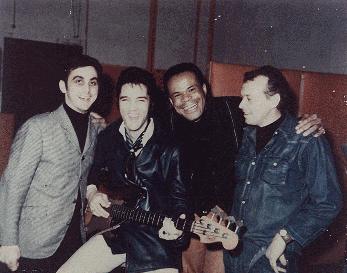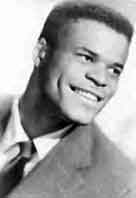Spotlight
on The King: the influence of Roy Hamilton
|
Continuing
our series on artists that influenced Elvis' musical
and performing style we look at the impact of the
incomparable Roy Hamilton.
Roy
Hamilton, born on April 16, 1929 in Leesburg, Georgia,
was one of those singers with an instantly recognizable
voice.
|
 |
It
was big, booming and able to 'sob' with the best. Roy could
convincingly deliver a rocker like Don't Let Go or gently
build the tension of a dramatic ballad like Unchained Melody.
It was these qualities that would attract and influence Elvis
Aron Presley.
Elvis
and Roy shared common musical roots, which would shape their
eventual singing styles: the combination of prevalent gospel
music during their early years and the pervasive presence
of rhythm and blues in their local neighborhoods.
There
was another similarity between the two men. While Elvis
was a white man who sounded like a black man, Roy was a
black man who sounded like a white man.
Many
of Roy's hits came from 'white' Broadway shows (for example,
You'll Never Walk Alone and If I Loved You, both came from
Carousel). The attraction of Roy's singing style to Elvis
is reflected well in Mark Marymont's observation about Hamilton,
an observation that could also have been said about Elvis:
"That
experience in the church was evident in his later singing
style, but he also blended that spiritual feeling with a
strong sense of rhythm and blues, even when he was singing
the corniest pop or Broadway ballads."
Roy
Hamilton's early years were characterized by regular appearances
in the church choir and success in sports. As a teenager
he became a Golden Gloves boxer and spent five years with
Jersey City's Searchlight Gospel Singers.
Not
surprisingly, Roy, like Elvis, entered local and area talent
quests and played local clubs and theatres. In 1953 Hamilton
secured a regular job at the 21 Club in Bayonne, New Jersey.
It was here that he met Bill Cook, his future manager, producer
and occasional songwriter. Cook is generally credited as
being the first black disc jockey and television personality
on the East Coast.
In
late 1953 Cook arranged a one year recording contract for
Roy with Epic Records, a subsidiary of industry giant Columbia.
Roy's first single You'll Never Walk Alone (the title track
for one of Elvis' RCA Camden albums) became a major hit.
Despite a strong operatic style it topped the Billboard
R&B chart and made the top 20 of the Hot 100 (pop) chart.
The
'B' side was I'm Gonna Sit Right Down and Cry (Over You)
which would become one of Elvis' early recordings for RCA.
Hamilton scored more hits with a string of singles: If I
Loved You promptly went Top 10 on the R&B chart and also
became a respectable Pop hit; Ebb Tide was followed by Hurt
and Unchained Melody, while later hits included the magical
You Can Have Her, I'll Come Running Back To You and the
great Don't Let Go.
 |
Unfortunately
after 1958 none of Roy's singles repeated his earlier
success. His last single to chart was You're Gonna Need
Magic, the similar sounding follow up to You Can Have
Her. Musicologist, Barney Hoskyns described Roy Hamilton
as having a "'pseudo-operatic' style firmly in the category
of 'sobbers and Doo-woppers". |
Hamilton
himself was quoted as saying: "My style is fifty percent Gospel,
thirty percent popular, and twenty percent semi-classical
with a touch of R&B." 'Handsome Roy's' success with You'll
Never Walk Alone, Unchained Melody and Ebb Tide resulted in
Sinatra style hysteria between 1953 and 1956.
In
heavy demand as a live performer but with minimal professional
experience in this regard, Bill Cook ensured Roy received
'quick stage presence' training in order that he could hold
his own with veterans including Duke Ellington and Ruth
Brown.
The
Roy Hamilton influence on Elvis is well demonstrated by
the fact that Elvis not only recorded several of Roy's hits
(primary examples being You'll Never Walk Alone, Hurt and
Unchained Melody), but importantly he also adopted Roy's
semi-operatic style and pacing.
Worth
and Tamerius in their substantial work, Elvis His Life From
A to Z, note that:
"Elvis
greatly admired Hamilton's singing ability and style and
performed a number of his ballads in Hamilton's style."
While
the Righteous Brothers version of Unchained Melody was a
bigger hit, it was Roy Hamilton's version on which Elvis
based his rendition. Elvis and Roy also recorded Pledging
My Love while Elvis sang You Can Have Her in concert in
1974-75. Joe Esposito notes the connection between Elvis
and Roy in his book Good Rockin' Tonight:
"Elvis
epitomized a generation that was struggling to carve an
identity separate from the mainstream post-war society enamored
of modern assembly line production, grey flannel suits,
and coolie-cutter suburban lifestyles. Conformity was the
buzzword of the day. But the rebellious among the youth
were discovering music as a break from conformity, particularly
intensely visceral R&B artists like Roy Hamilton, Bo Diddley,
and their white imitators".
Another
Memphis Mafia member, Marty Lacker, has said that Elvis
stated his musical influences as including Roy Hamilton,
Brook Benton and Jake Hess among others. A reviewer of Roy
Hamilton albums on MainSeek.com stated: "When I hear Elvis
sing it is so clear to me that's he's trying his darndest
to sound like Roy Hamilton on some records and then The
Ink Spots on others. But Elvis loved Black people and Black
music - a fact that was suppressed back then and is still
suppressed even today".
In
1969 Elvis and Roy met at the American Sound Studios in
Memphis. Both were being produced by Chips Moman - Elvis
at night and Roy during the day. Elvis would sometimes arrive
early to listen to Roy.
It
was during their meeting in July 1969 that Elvis offered
Roy the Barry Mann - Cynthia Weill song Angelica. The result
was a soaring, dramatic rendition that unfortunately struggled
to find radio airplay.It
also turned out to be Roy's last single.
Sadly,
on 20 July, 1969, the distinctive voice of Roy Hamilton
was silenced when he died following a stroke. While receiving
his Jaycees award as one of the Ten Outstanding Young Men
of America in 1971, Elvis recited part of Roy's 1955 recording
Without A Song:
"I
learned very early in life that without a song the day would
never end Without a song a man ain't got a friend Without
a song the road would never bend Without a song. So I'll
keep singing the song."
References:



